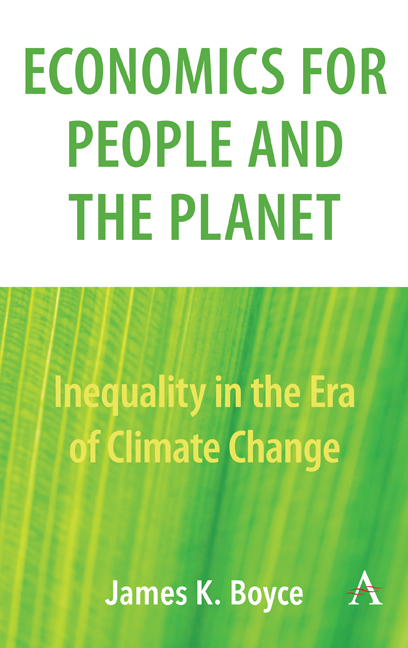Book contents
- Frontmatter
- Contents
- List of Illustrations
- Acknowledgements
- Part I Rethinking Economics and the Environment
- Part II Environmental Injustice
- Part III Climate Policy
- Chapter 17 Smart Climate Policy
- Chapter 18 Investment in Disadvantaged Communities
- Chapter 19 Dividends for All
- Chapter 20 Truth Spill
- Chapter 21 Four Pillars of Climate Justice
- Chapter 22 The Perverse Logic of Offsets
- Chapter 23 Climate Policy as Wealth Creation
- Chapter 24 The Carbon Dividend
- Chapter 25 Keeping the Government Whole
- Chapter 26 Air Quality Co-benefits in Climate Policy
- Chapter 27 Climate Adaptation: Protecting Money or People?
- Chapter 28 Forging a Sustainable Climate Policy
- Notes
- Publication History
- Index
Chapter 26 - Air Quality Co-benefits in Climate Policy
from Part III - Climate Policy
Published online by Cambridge University Press: 12 February 2019
- Frontmatter
- Contents
- List of Illustrations
- Acknowledgements
- Part I Rethinking Economics and the Environment
- Part II Environmental Injustice
- Part III Climate Policy
- Chapter 17 Smart Climate Policy
- Chapter 18 Investment in Disadvantaged Communities
- Chapter 19 Dividends for All
- Chapter 20 Truth Spill
- Chapter 21 Four Pillars of Climate Justice
- Chapter 22 The Perverse Logic of Offsets
- Chapter 23 Climate Policy as Wealth Creation
- Chapter 24 The Carbon Dividend
- Chapter 25 Keeping the Government Whole
- Chapter 26 Air Quality Co-benefits in Climate Policy
- Chapter 27 Climate Adaptation: Protecting Money or People?
- Chapter 28 Forging a Sustainable Climate Policy
- Notes
- Publication History
- Index
Summary
Climate policy not only can benefit future generations: the here-and-now benefits of clean air are a compelling reason to phase out fossil fuels.
In addition to reducing emissions of carbon dioxide, policies that curtail the use of fossil fuels reduce emissions of many other air pollutants that harm human health, including particulate matter, sulfur dioxide, nitrogen oxides and carbon monoxide. In fact, some studies that have assigned monetary values to the damages from carbon dioxide and these ‘co-pollutants’ have put higher values on the latter. Co-pollutant intensity (the ratio of co-pollutant damages to carbon dioxide emissions) varies across emission sources, and for this reason the pattern of emissions reductions across locations and economic sectors is important for both efficiency and equity.
The World Health Organization characterizes air pollution as ‘the world's largest single environmental health risk’. Outdoor air pollution is responsible worldwide for 3.7 million deaths annually.
Valuing the Human Costs of Air Pollution
A multi-country analysis by the Organisation for Economic Co-operation and Development (OECD) concluded in 2014 that outdoor air pollution (specifically, particulate matter and ozone) was responsible for 2.45 million premature deaths annually in the OECD countries plus China and India (see Table 26.1). To monetize these impacts, the OECD multiplied the number of deaths by the ‘value of a statistical life’ (VSL), computed as a function of national income per capita, adding 10 per cent for the costs of non-fatal illnesses. The resulting total cost of human health effects of outdoor air pollution in these countries amounted to $3.5 trillion per year, with the OECD member countries accounting for about half and China and India for the rest.
In these calculations, the study used country-specific VSLs that place a lower value on air pollution deaths in India and China than in the wealthier OECD countries, offering the following rationale:
A VSL value is meant to be an aggregation of individual valuations: an aggregation of individuals’ WTP [willingness to pay], as communicated through WTP surveys, to secure a marginal reduction in the risk of premature death. In the world as we know it, individuals are differently endowed with the means with which to make such a trade-off; some work for their living for a dollar a day, some inherit a fortune yielding unearned income of a billion dollars a year.
- Type
- Chapter
- Information
- Economics for People and the PlanetInequality in the Era of Climate Change, pp. 125 - 132Publisher: Anthem PressPrint publication year: 2019



